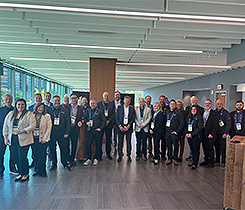Educating your employees on autogas
Autogas, as the readily viable option to drive exponential 12-month propane volume in America to the benefit of every marketer through infrastructure and production increases, remains handcuffed to a selective education of our industry’s workforce.
Such a systemic impact need not affect this important and vital opportunity for our future. Releasing the handcuffs that currently constrain autogas gallon growth can be easily achieved through marketer commitment to have informed employees, regardless of a marketer’s immediate ability for involvement in the autogas movement.
As a person who has a keen appreciation of the considerable commitment for a company to become a full-service autogas-driven company, I do understand, but cringe, when some in the industry either directly or passively bypass the autogas movement in its entirety; when all that is necessary to choose a stellar future for our industry’s growth is to provide avenues for an informed employee base about propane as a motor fuel. While gallon growth through autogas volume is bearing out greater marketer involvement and success, I provide the following as a case in point regarding the need for that greater education to our customer-facing representatives.
In working with a prospect to advance his fleet to autogas, the prospect asked for some comfort about our industry’s commitment to the autogas movement. He asked the propane company representative to join him in calling around the state and inquiring about available autogas fueling centers and pricing, should he add propane units to his fleet. The propane company representative agreed to his request, and upon calling a wide range of marketers, from majors to independents, here was the underwhelming response to the prospect’s test of autogas supply:
■ Calls to marketers resulted in ambiguous answers as to where, or if, they could fill an autogas-propelled vehicle. Most company representatives who initially answered the phone said they did not understand what the caller was asking for and, therefore, they were not comfortable providing the prospect with a cost per gallon.
■ Calls found marketer representatives uninformed on how to handle the road tax required to be charged and collected on autogas gallons. In the case of public transportation, they could not assist the caller in confirming the process for exemption of road tax for the sale of autogas into those vehicles.
Suffice to say our industry will continue to hinder its immediate and best opportunity for growth of 12-month demand if companies do not, at the very least, educate their customer-facing employees on autogas, regardless of their ability to take part. Altruistically, our industry cannot afford this kind of selective lack of knowledge to customer-facing opportunity when the answer is an easily informed workforce.
At the very least, a fact sheet in the hand of every customer service representative and customer-facing person in the company should cover:
- “Autogas” is the worldwide-recognized moniker to define propane used as a motor fuel for vehicles and small engines such as lawn mowers.
- Regardless of the type of propane system on a vehicle, autogas-fueled systems are one of the most eco-friendly motor fuels with arguably the best “total cost of ownership” return on investment to consumers.
- Filling a vehicle may (or may not) take improvements, including filler adaptation to a dispenser system with a low-emission nozzle, but the concept is the same as filling any container. A company should inform its coworkers on where they stand with equipment and code compliance in filling a customer’s motor-fuel needs.
- Road tax is applicable to autogas sales. A company should inform its coworkers of that important point, as well as the state and federal tax rates. Municipalities and school districts may be exempt from road tax, and those entities can provide proof of exemption.
A fully informed representation of autogas is to everyone’s long-term benefit. Those called upon in the propane industry should be able to respond with an informational return to consumers that drives the success of 12-month demand, including reasonable supply options for the consumer that drives the industry forward. Our industry is poised for exponential growth. Let’s collectively support this vital initiative through the education of our workforce.
Jim Olson is a career business leader of growth initiatives, serving the industry on various Wisconsin, Minnesota and NPGA committees, task forces and boards. Formerly with Como Oil and Propane and ThompsonGas, he has recently joined Westmor Industries.


















Jim,
While I truly respect your article I don’t see any value in employees touting the benefits of Autogas until the owners and equipment purchasing decision makers for the companies that they work for actually put Autogas vehicles to work in their own fleets. Our beloved Industry has yet to even begin using our own fuel. How do you see the sales conversation going with potential fleet operators when they find out the very company that is trying to convince them to switch fuels does not use the fuel themselves. Autogas will continue to go NOWHERE until we commit to use it ourselves. As in any industry several marketers will be successful by getting really good at the niche markets but niche is all I believe you will ever see out of the Propane Autogas Industry.
Joe Silva Sr.
Pres/GM
EnviroPro Energy Company
Response to Joe Silva Sr.
It would indeed be a self-fulling prophecy if marketers continue to pass on any number of paths of opportunity.
This article was written in the frame that this best option in the history of propane gallon growth can have steps forward through simple education. The more knowledge the less suspect the opportunity is viewed. Education is cheap and the ability for CSR’s and company employees to talk the talk will start sending customers to their locations for gallons, albeit small at first, they can at least start driving customers (literally) to their locations.
Marketers, sadly, may choose not to engage in propane powered units, but they exponentially pass on gallons when they casually turn customers away that then also impacts the rest of industry.
It is not a pipe-dream, 12 month volume of autogas driven units CAN impact supply, infrastructure, and production to everyone’s benefit. Those having made the choice early to get in are reaping exponential gallons as customers starting with two units go to 20 units (just one example of a true story).
There are no shortcuts to gallon growth and supply stability, just commitment. AutoGas offers any number of levels in which to engage that commitment, why not start with employee education.
Jim Olson
Westmor Industries